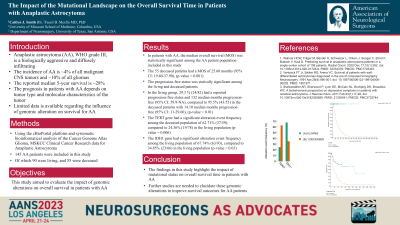The Impact of the Mutational Landscape on the Overall Survival Time in Patients with Anaplastic Astrocytoma
Friday, April 21, 2023

Has Audio

Caitlyn Smith, BS
Medical Student
University of Missouri School of Medicine
Columbia, Missouri, United States
ePoster Presenter(s)
Introduction: Anaplastic astrocytoma (AA), WHO grade III, is a biologically aggressive and diffusely infiltrating. The incidence of AA is ~4% of all malignant CNS tumors and ~10% of all gliomas. The reported median 5-year survival is ~28%. The prognosis in patients with AA depends on tumor type and molecular characteristics of the tumor. Limited data is available regarding the influence of genomic alteration on survival for AA. This study aimed to evaluate the impact of genomic alterations on overall survival in patients with AA.
Methods: Using the cBioPortal platform and systematic bioinformatical analysis of the Cancer Genome Atlas Glioma, MSKCC Clinical Cancer Research data for Anaplastic Astrocytoma, 145 AA patients were included in this study. Of which 90 were living, and 55 were deceased, respectively.
Results: In patients with AA, the median overall survival (MOS) was statistically significant among the AA patient population included in this study. The 55 deceased patients had a MOS of 25.60 months (95% CI: 19.40-37.90), (p-value = 0.001). The progression-free status was statically significant among the living and deceased patients. In the living group, 29.3 % (24/82) had a reported progression-free status and 132 median months progression-free (95% CI: 59.9-NA), compared to 95.5% (43/55) in the deceased patients with 14.10 median months progression-free (95% CI: 11-29.60), (p-value = 0.01). The TERT gene had a significant alteration event frequency among the deceased population of 62.71% (37/59), compared to 24.36% (19/78) in the living population (p-value = 0.006). The IDH1 gene had a significant alteration event frequency among the living population of 67.74% (63/93), compared to 34.85% (23/66) in the living population (p-value = 0.03).
Conclusion : The findings in this study highlight the impact of mutational status on overall survival time in patients with AA. Further studies are needed to elucidate these genomic alterations to improve survival outcomes for AA patients.
Methods: Using the cBioPortal platform and systematic bioinformatical analysis of the Cancer Genome Atlas Glioma, MSKCC Clinical Cancer Research data for Anaplastic Astrocytoma, 145 AA patients were included in this study. Of which 90 were living, and 55 were deceased, respectively.
Results: In patients with AA, the median overall survival (MOS) was statistically significant among the AA patient population included in this study. The 55 deceased patients had a MOS of 25.60 months (95% CI: 19.40-37.90), (p-value = 0.001). The progression-free status was statically significant among the living and deceased patients. In the living group, 29.3 % (24/82) had a reported progression-free status and 132 median months progression-free (95% CI: 59.9-NA), compared to 95.5% (43/55) in the deceased patients with 14.10 median months progression-free (95% CI: 11-29.60), (p-value = 0.01). The TERT gene had a significant alteration event frequency among the deceased population of 62.71% (37/59), compared to 24.36% (19/78) in the living population (p-value = 0.006). The IDH1 gene had a significant alteration event frequency among the living population of 67.74% (63/93), compared to 34.85% (23/66) in the living population (p-value = 0.03).
Conclusion : The findings in this study highlight the impact of mutational status on overall survival time in patients with AA. Further studies are needed to elucidate these genomic alterations to improve survival outcomes for AA patients.
